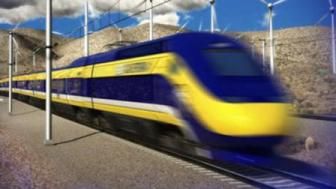Not just in China: The corrupt act that got CA bullet train passed
by CalWatchdog Staff | April 12, 2013 6:15 am
April 12, 2013
By Chris Reed
 The news that the former head of China’s bullet-train program is facing corruption charges[1] probably prompts some Californians to wonder if any of the people who aggressively lied Proposition 1A to passage in 2008 should face similar charges.
The news that the former head of China’s bullet-train program is facing corruption charges[1] probably prompts some Californians to wonder if any of the people who aggressively lied Proposition 1A to passage in 2008 should face similar charges.
This may seem far-fetched. Having politicians exaggerate or fabricate claims to win approval of pet projects is nothing new. But on a very specific point related to the 2008 campaign for the project, the law appears to have been broken by the staff of the California High-Speed Rail Authority, and in a way that helped enable Prop. 1A’s passage. I wrote about this in December 2011[2] on the late, occasionally great Calwhine site.
Legally required business plan not released before 2008 vote
Here’s a clip from the Oct. 9, 2008, San Francisco Chronicle that is key to understanding this scandal:
“A group opposing Proposition 1A, the high-speed rail bond measure, filed suit against the California High Speed Rail Authority on Wednesday for failing to release an updated business plan by a Sept. 1 deadline.
“’A more clear violation of law is hard to imagine,’ said Jon Coupal, president of the Howard Jarvis Taxpayers Association said in a press release. His group filed the suit and is opposing the measure.
“The suit seeks a court order mandating the report be produced ‘as required by law.’
“But authority officials say that’s impossible -– and that the association knows that.
“Legislation signed by Gov. Arnold Schwarzenegger on Aug. 27 required the updated business plan but authority officials said they wouldn’t have money to work on it until the state passed a budget, and estimated it would take 45 days to complete. The budget was signed on Sept. 23 – 85 days late. …
“Authority spokeswoman Kris Deutschmann said most of the contents of the plan have already been made public, but they need to be compiled and updated – a process that will be completed within weeks. That could be before or after the Nov. 4 election, she said.”
Voters never told CHSRA staff said investors would want guarantees
Jon Coupal was right to be irate. Keep in mind where we were in October 2008 with the election four weeks off. As I wrote in 2011, at that point, all Californians had heard was happy talk, especially a ballot description that was so ridiculous that it prompted a state appeals court to rule the Legislature could no longer draft ballot descriptions[3]. And when the business plan finally was released — days after the election — it was full of happy talk. But it also had one paragraph that could have turned the election had it been widely publicized (the bolding is mine):
“In the spring of 2008, the Authority issued a Request for Expressions of Interest (RFEI) as an effort to gauge private sector interest in participating in a P3 arrangement for the high-speed train project. Interest was strong, especially among construction firms, system and equipment providers, financial institutions and operators. However, most private firms responding made it clear that they would need both financial and political commitments from state officials that government would share the risks to their participation. The amount of private funding and timing of private sector participation will be a reflection of how risky the private sector perceives this project overall.”
‘Shared risk’ = implied promise of subsidies
 As I noted in 2011, “shared risk” equals commitment to provide public funding — i.e., taxpayer subsidies — should ridership or revenue come up short. That’s illegal under Proposition 1A. And that is what the CHSRA business plan for the project contemplated all along — except voters weren’t told about it until days after giving their blessing (and $9.95 billion) to the project.
As I noted in 2011, “shared risk” equals commitment to provide public funding — i.e., taxpayer subsidies — should ridership or revenue come up short. That’s illegal under Proposition 1A. And that is what the CHSRA business plan for the project contemplated all along — except voters weren’t told about it until days after giving their blessing (and $9.95 billion) to the project.
So is this as abjectly corrupt as the bribe-taking allegedly seen in China? No. But it’s close.
The people pushing the bullet train knew BEFORE Prop. 1A passed that it didn’t have a legal business plan and that a key promise couldn’t be met. But they didn’t share that with voters, who narrowly approved[4] the project.
This is an appalling scandal, and a sick commentary on the people in charge of the California High-Speed Rail Authority in fall 2008.
- facing corruption charges: http://www.latimes.com/news/local/political/la-me-pc-china-jerry-brown-rail-20130410,0,3749324,print.story
- December 2011: http://www.calwhine.com/bullet-train-p-r-biggest-scandal-of-all-is-hiding-of-key-fact-in-2008/586/
- could no longer draft ballot descriptions: http://blogs.sacbee.com/capitolalertlatest/2011/01/appeals-court-rules-legislatur.html
- narrowly approved: http://ballotpedia.org/wiki/index.php/California_Proposition_1A,_High-Speed_Rail_Act_%282008%29
Source URL: https://calwatchdog.com/2013/04/12/not-just-in-china-the-corrupt-act-that-got-ca-bullet-train-passed/